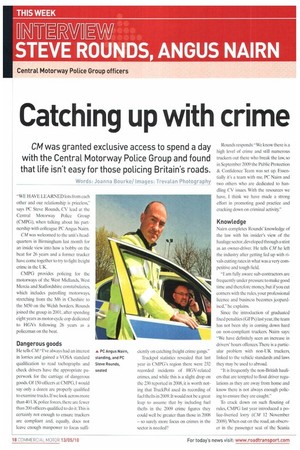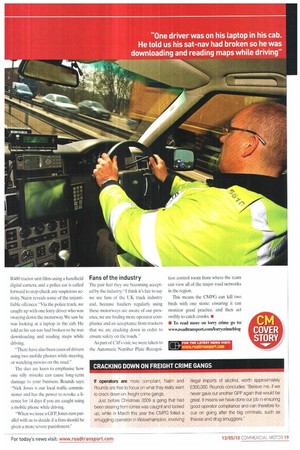Catching up with crime
Page 18

Page 19

If you've noticed an error in this article please click here to report it so we can fix it.
CM was granted exclusive access to spend a day with the Central Motorway Police Group and found that life isn't easy for those policing Britain's roads.
Words: Joanna Bourke/ Images: Trevatan Photography
"WE HAVE LEARNED lots from each other and our relationship is priceless,says PC Steve Rounds, CV lead at the Central Motorway Police Group (CMPG), when talking about his partnership with colleague PC Angus Nairn.
CM was welcomed to the unit's headquarters in Birmingham last month for an inside view into how a bobby on the beat for 26 years and a former trucker have come together to try to fight freight crime in the UK.
CMPG provides policing for the motorways of the West Midlands, West Mercia and Staffordshire constabularies, which includes patrolling motorways, stretching from the M6 in Cheshire to the M50 on the Welsh borders. Rounds joined the group in 2001, after spending eight years as motor-cycle cop dedicated to HCrVs following 26 years as a policeman on the beat.
Dangerous goods He tells CM: "I've always had an interest in lorries and gained a VOSA standard qualification to read tachographs and check drivers have the appropriate paperwork for the carriage of dangerous goods. Of 150 officers at CMPG, I would say only a dozen are properly qualified to examine trucks. If we look across more than 40 UK police forces, there arc fewer than 200 officers qualified to do it.Th is is certainly not enough to ensure truckers are compliant and, equally, does not leave enough manpower to focus suffi
ciently on catching freight crime gangs."
"Fruckpol statistics revealed that last year in CMPG's region there were 232 recorded incidents of HGV-related crimes, and while this is a slight drop on the 230 reported in 2008, it is worth noting that TruckPol axed its recording of fuel thefts in 2009. It would not be a great leap to assume that by including fuel thefts in the 2009 crime figures they could well be greater than those in 2008 — so surely more focus on crimes in the sector is needed? Rounds responds:"We know there is a high level of crime and still numerous truckers out there who break the law, so in September 2009 the Public Protection & Confidence Team was set up. Essentially it's a team with me, PC Nairn and two others who are dedicated to handling CV issues. With the resources we have, I think we have made a strong effort in promoting good practice and cracking down on criminal activity"
Knowledge Nairn completes Rounds' knowledge of the law with his insider's view of the haulage sector, developed through a stint as an owner-driver. He tells CM he left the industry after getting fed up with rivals cutting rates in what was a very competitive and tough field.
"I am fully aware sub-contractors are frequently under pressure to make good time and therefore money, but if you cut corners with the rules, your professional licence and business becomes jeopardised," he explains.
Since the introduction of graduated fixed penalties (GFPs) last year, the team has not been shy in coming down hard on non-compliant truckers. Nairn says: "We have definitely seen an increase in drivers' hours offences. There is a particular problem with non-UK truckers, linked to the vehicle standards and laws they may be used to abroad.
"It is frequently the non-British hauliers that are tempted to flout driver regulations as they are away from home and know there is not always enough policing to ensure they are caught."
To crack down on such flouting of rules, CMPG last year introduced a police-liveried lorry (CM 12 November 2009). When out on the road, an observer in the passenger seat of the Scania R480 tractor unit films using a handheld digital camera, and a police car is called forward to stop-check any suspicious activity. Nairn reveals some of the unjustifiable offences: "Via the police truck. we caught up with one lorry driver who was swaying down the motorway. We saw he was looking at a laptop in the cab. He told us his sat-nay had broken so he was downloading and reading maps while driving.
"There have also been cases of drivers using two mobile phones while steering, or watching movies on the road."
The duo are keen to emphasise how one silly mistake can cause long-term damage to your business. Rounds says: "Nick Jones is our local traffic commissioner and has the power to revoke a licence for 14 days if you are caught using a mobile phone while driving.
"When we issue a GFP, Jones runs parallel with us to decide if a firm should be given a more severe punishment."
Fans of the industry
The pair feel they are becoming accepted by the industry: "I think it's fair to say we are fans of the UK truck industry and, because hauliers regularly using these motorways are aware of our presence, we are finding more operator compliance and an acceptance from truckers that we are cracking down in order to ensure safety on the roads."
As part of CM's visit, we were taken to the Automatic Number Plate Recogni tion control room from where the team can view all of the major road networks in the region.
This means the CMPG can kill two birds with one stone: ensuring it can monitor good practice, and then act swiftly to catch crooks. •
• To read more on lorry crime go to: nww.roadtmnsport.com/lorrycrimeblog
































































































































